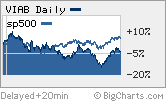 |
| The "new" Viacom will own faster-growing cable channels while CBS will own the slower-growth broadcast TV and radio networks. |
|
 |
| Not an amicable breakup: Despite plans to split into two companies, Viacom's stock has still lagged the broader market this year. |
|
|
|
|
|
|
|
|
|
| More about the media and entertainment biz
|
|
|
|
|
NEW YORK (CNNMoney.com) � Investors in beaten down media companies are about to find out if breaking up is the answer to the sector's woes.
Viacom, by the end of this year, is set to split into two companies, one that will retain the Viacom name and another that will be called CBS.
The "new" Viacom will consist of most of Viacom's cable networks (MTV, Nickelodeon and Comedy Central, for example) and its Paramount movie studio, which recently announced it was buying DreamWorks SKG.
CBS will own the namesake TV network, UPN, a radio and outdoor advertising business, the Simon & Schuster book publishing company and cable network Showtime.
In theory, break-ups are supposed to unlock value in big diverse businesses, but Wall Street hasn't bought in, with the stock flat since the idea was floated earlier this year.
Some think that Viacom (Research) stock has struggled not because of diversity but because of weak results -- and a split won't fix that.
"I'm not sure that Viacom had a problem with what we call a conglomerate discount," said Philip Remek, an analyst with Guzman & Co. "I don't think the company had to split up so I see this as a non-event. I don't buy the idea of this unlocking value since various units of the company either perform or they don't."
Viacom for growth and CBS for value
Still, others think that the split will be beneficial since the two companies are expected to attract different types of investors. For example, the new Viacom assets have, for the past few years, grown at a faster rate than the CBS businesses.
According to documents filed with the SEC, the businesses that make up the new Viacom generated sales of $6.9 billion in the first three quarters of 2005, up 22 percent from a year ago. Net income was $1.2 billion, an increase of 19 percent.
CBS had revenue of $10.7 billion through the first three quarters, up about 4 percent from the same period last year. CBS reported net income of $982.4 million for the first nine months of the year. It lost money during the first three quarters of 2004.
Last year, revenues for the new Viacom were up 11 percent while CBS revenues increased 7 percent. And in 2003, revenues for the new Viacom were up 21 percent while CBS sales rose just 3 percent.
But CBS should be a steady generator of cash and as such, it is expected to pay a dividend.
"Perhaps an investor interested in growth would want to own Viacom and a value investor would want CBS," said Mike Arone, a portfolio manager with State Street Global Advisors, which owns Viacom in the SSgA Large Cap Value and SSgA Directional Core Equity funds.
Another analyst said that Viacom chairman and CEO Sumner Redstone made the right move with the split since concerns about growth at CBS have hurt Viacom's stock.
Although the CBS network is doing well in the ratings, there are still worries about how strong TV ad growth could be going forward due to technology such as digital video recorders and the migration of viewers to cable and the Internet.
And the loss of "shock jock" Howard Stern to satellite radio company Sirius (Research) could lead to a hit in revenue and profits for CBS' radio unit.
"It does make sense to help focus investors," said Frederick Moran, an analyst with Stanford Group. "Sumner Redstone thought that the difference between the two pieces was holding back Viacom's valuation."
To that end, all of Viacom currently trades at about 8 times 2006 earnings before interest, taxes, depreciation and amortization (EBITDA) estimates. On a standalone basis, Moran said the new Viacom could fetch a multiple of closer to 13 times EBITDA.
Another fund manager thinks that the split will make it easier for the new Viacom to find ways to keep growing through acquisitions.
"The DreamWorks deal is a good example of the flexibility and aggressiveness with which Viacom is approaching its allocation of capital," said Gerry Bollman, portfolio manager with Great Companies, which owns Viacom in the TA Idex Great Companies-America fund. "This could revive Paramount and make it one of the premier studios."
Moran also argues that the new Viacom will also benefit from a stronger balance sheet. It will have less debt than CBS and has already announced plans for a buyback of up to $3 billion in new Viacom shares.
Still, the biggest frustration in trying to figure out what will happen with the new Viacom and CBS, or any media stock for that matter, is that media investors often pay more attention to the personalities of the high-profile executives and not the numbers.
Walt Disney (Research), for example, had been held back in recent years because of the turmoil surrounding the status of former CEO Michael Eisner. And Redstone also can be a polarizing figure. Personality conflicts are believed to be the reason why Mel Karmazin, formerly Viacom's COO, left last year. He is now CEO of Sirius.
"There is one problem with judging media companies using earnings estimates. Often what happens with media stocks is that ego drives stock prices, not fundamentals," said Arone.
To read about why Mel Karmazin is having fun at Sirius, click here.
To find out why media execs have fallen off their pedestals this year, click here.
For a look at more media and entertainment stocks, click here.
Analysts quoted in this story do not own shares of the companies mentioned and their firms have no investment banking relationships with the companies.

|